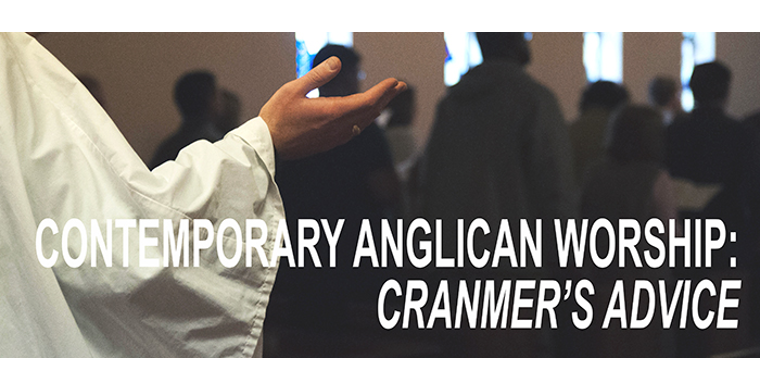The Wealth of Classic Anglican Liturgy (1)
By Roger Salter
Special to Virtueonline
www.virtueonline.org
August 21, 2015
Nothing in the way of liturgical revision within the Anglican Communion has yet surpassed the excellence of the Cranmerian compendium of Biblical and Augustinian doctrine and devotion. While the quest for contemporary styles of worship and Christian nurture is a legitimate and necessary enterprise in every generation the sturdy and substantial text of the BCP 1662 must always remain as the supreme standard for every form of public worship proposed and adopted within the Anglican fellowship.
Cranmer's masterly manual is not perfect. No human composition could ever be so. But his digest of Reformed conviction and worthy worship is the fully detailed "birth certificate" and collection of constitutional documents of the Anglican expression of the Christian faith. It derives from an era of crucial insight into the truth of God and the abandonment of intellectual structures, sacramental superstitions, and wicked religious inventions that for so long eclipsed the glory of the gospel and the liberating way of salvation through the grace of Jesus Christ alone.
Cranmer and his colleagues defined the fundamental character of Anglicanism, and the perilous errors of the age that pressured the research and resurgence of Scriptural orthodoxy, and the clarification of saving truth, determined an interpretation of divine revelation of immense power, pertinence, and soul-developing impact. The historical context that shaped the legacy of the Reformers ensured confessional utterances and exclamations of the worth of God and his boundless mercy that would be of enormous weight and infinite value. Their cause was of great gravity and urgency. They strove valiantly with God-given might, endurance of spirit, and shedding of blood to secure the grasp upon eternal redemption for their generation and for generations to come.
These framers and founders of the heritage with which we are now entrusted were serious men driven by the interior joy of knowing and serving the Lord Christ. The literary product of their godly scholarship and spiritual maturity through communion with and reliance upon their Savior is replete with illuminating and fortifying content that can strengthen, steady, establish and equip every believer who is willing to avail themselves
of the enlightenment, edification, and encouragement afforded by the daily companionship of the architects of the English Reformation, for Cranmer wielded the pen of his partners in reform.
They culled rich spiritual resources primarily from the Word of God and then from the best phases of Christian insight and understanding throughout the Church's history to provide a comprehensive approach to God through all the scenes of life whether in community with others or in individual appointments with the Lord, public praise and private prayer.
Our Prayer Book is not indispensable in our walk with God, nor to our rule of life, but in his providence it is a mighty aid and comfort, expanding our awareness before God and encompassing aspects of belief and supplication not always present at all times to our limited minds and often languishing and changeable spirits. Private use of the liturgy involves us in the payer of the universal people of God and it enlarges our concerns and sympathies. It takes us out of ourselves and the cuddling and cosseting of our egos. It counters and cancels the introversion and overly subjective nature of much private devotion that can be dogged by fluctuating emotion and whimsical disposition. Liturgy is a framework for spiritual exercises and a stimulant of wholesome feeling in accord with divine truth and the tuition of the Holy Spirit.
Orthodox variation in congregational approaches to God and personal companionship with him can be immensely beneficial. Christian discipline is not about rigidity but consistency, and thought and behavior consonant with the teaching of Holy Scripture. Heartfelt formality and reverent informality comprise our times together in the presence of the Lord. Always there must be understanding.
Here lies the inestimable value of the BCP 1662. It is a treasure trove of wisdom, providing magnificent concepts of God and amazing perspectives of his ways. Its vocabulary of language as a vehicle of honoring him worthily is excellent and a delight to the tongue of the worshipper as well as a fitting tribute to our Sovereign. Mind and heart swell in the use of our precious liturgy endorsed by eminent primates and preachers whose first priority was to preach Christ faithfully (e.g. Whitefield, Romaine, Venn, Grimshaw, Toplady, Ryle, McIlvaine. There is no embarrassment in the use of liturgy for Evangelicals). And even the "outdated" language, as many allege, has its benefits. Ashley Null suggests that it causes us to pause over the words we employ and probe their meaning. Sometimes we are convinced that modern revision cannot improve the sense of "Archbishop Cranmer's Immortal Bequest" (Samuel Leuenberger, with a Foreword to the Edition by James I. Packer, Wipf & Stock, Eugene, Oregon, 2004).
Can anything better describe the condescension and compassion of God in the Incarnation more efficiently than the traditional words of the Te Deum in 1662: "When thou tookest upon thee to deliver man: thou didst not abhor the Virgin's womb"? (cf "You humbled yourself to be born of a Virgin". Which rendition makes you sit bolt upright with wonder?).
To be continued...














